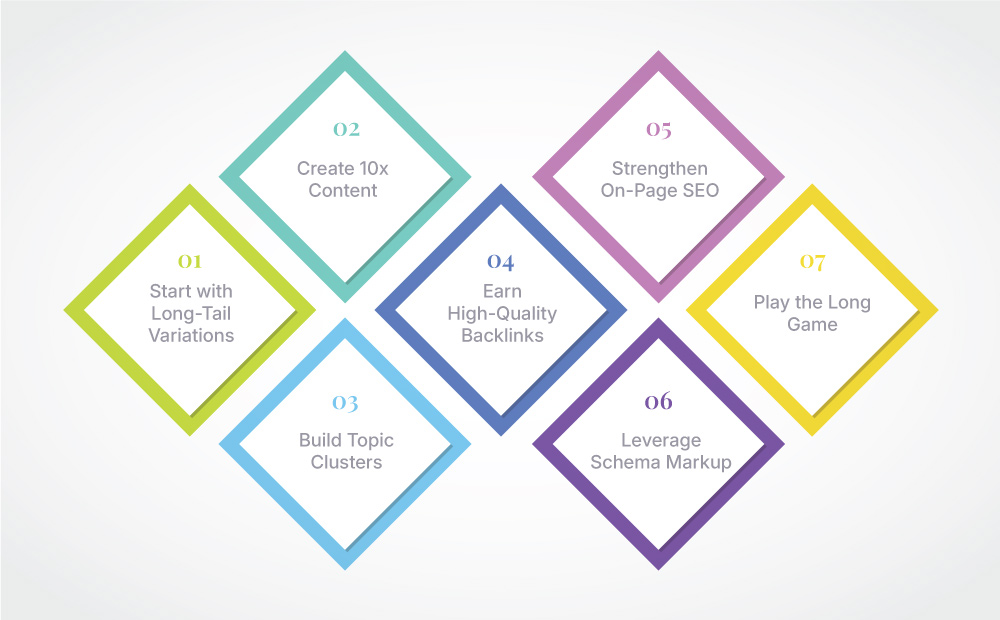In SEO, not all keywords play by the same rules. Some are quick wins, others are uphill battles. The most valuable search terms in any niche are called competitive keywords, and ranking for them can mean explosive traffic growth, brand visibility, and revenue.
But here’s the truth: you can’t win these battles with keyword stuffing or luck. Competing for high-value terms requires strategy, authority, and persistence.
Let’s break down what makes a keyword competitive, how to identify it, and what it really takes to outrank your strongest competitors.
What Are Competitive Keywords?
Competitive keywords are high-demand search terms that many websites are trying to rank for. These keywords usually have:
- High search volume (thousands of monthly searches)
- High intent – users are close to buying or deeply researching
- High keyword difficulty (KD) score in SEO tools like Ahrefs, Semrush, or Moz
- SERPs dominated by authoritative domains like HubSpot, Forbes, or government sites
Examples:
- “Best project management software”
- “CRM tools for small business”
- “Cloud storage”
- “Digital marketing services”
If a keyword drives money or consistent traffic, it’s competitive.
Data Insight: According to Ahrefs, only 0.13% of websites rank in the top 10 for a keyword in less than a year. That’s how tough competitive SEO can be.
Why Are Competitive Keywords So Hard to Rank For?
Because everyone wants them and Google rewards authority.
High-competition SERPs are usually dominated by brands that have:
- A strong backlink profile
- Comprehensive, E-E-A-T-rich content (Expertise, Experience, Authoritativeness, Trustworthiness)
- Solid domain authority and topical depth
- Positive user engagement signals (CTR, dwell time, bounce rate)
You’re not just optimizing for algorithms, you’re battling industry leaders who’ve invested in SEO for years.
How to Identify Competitive Keywords
Use SEO tools like:
- Semrush: Look for keywords with high CPC and volume
- Ahrefs: Check KD score + SERP overview
- Google Search: Analyze who’s ranking (are they .gov, .edu, or massive publishers?)
Also, ask yourself:
- Are big brands dominating the top 5?
- Is the content deeply authoritative?
- Are there paid ads, shopping results, and featured snippets?
If yes to most, you’re looking at a competitive keyword.
How to Identify Competitive Keywords
Here’s how you can spot them quickly:
1. Use SEO Tools
- Semrush: Check keywords with high CPC and volume.
- Ahrefs: Look at KD scores (60+ = high competition).
- Moz: Use “Keyword Difficulty” and “Priority” metrics.
2. Analyze the SERP
Search the keyword on Google and ask:
- Are the top 5 results from big brands (.gov, .edu, or major publishers)?
- Is the content long-form, updated, and authoritative?
- Are there ads, shopping results, or featured snippets dominating?
If yes, it’s a competitive keyword.
7 Proven Strategies to Rank for Competitive Keywords

1. Start with Long-Tail Variations
Don’t start with “CRM software.” Instead, go after more specific phrases like:
- “CRM software for nonprofits”
- “Best lightweight CRM for startups”
These low-competition, high-intent keywords help you build topical authority, then you can climb up to broader, high-volume ones.
2. Create 10x Content
Don’t be slightly better than competitors, be 10x better.
That means:
- Deep, actionable insights
- Up-to-date statistics
- Expert quotes and visuals
- FAQs and internal linking
According to Backlinko, long-form, data-driven content gets 77% more backlinks and performs better in SERPs.
3. Build Topic Clusters
Google rewards content depth and context. Use the hub-and-spoke model:
- Create a pillar page for your main keyword.
- Support it with cluster articles covering related subtopics.
This internal linking structure signals topical authority to Google.
4. Earn High-Quality Backlinks
Backlinks remain one of Google’s strongest ranking factors.
Ways to earn them:
- Publish original research or data reports
- Guest post on authoritative blogs
- Launch digital PR campaigns to earn mentions naturally
5. Strengthen On-Page SEO
Every element on your page should be laser-focused:
- Include LSI (semantic) keywords your competitors use (use Surfer SEO or Clearscope for this)O or Clearscope to match semantic terms your competitors use.
- Place your main keyword in the title, H1, and first 100 words
- Add internal links to related content
- Optimize images with descriptive alt text
6. Leverage Schema Markup
Schema markup helps your content stand out in SERPs with rich results.
Use:
- FAQ Schema for question-rich snippets
- How-To Schema for instructional guides
- Review Schema to boost trust signals
Even if you’re not ranking #1, schema can help you own more SERP real estate.
7. Play the Long Game
Ranking for competitive terms takes time. It’s a marathon, not a sprint.
Keep improving by:
- Updating old articles with new stats
- Consolidating thin or underperforming content
- Tracking rankings monthly and adjusting accordingly
Patience + consistency = authority.
Conclusion
Ranking for competitive keywords isn’t easy but it’s absolutely achievable.
Start small with long-tail queries, create content that truly outperforms your competitors, and earn backlinks naturally through value.
The key is to think like Google: deliver the most relevant, expert, and trustworthy information possible. Over time, you’ll not only break into tough SERPs but also build the kind of domain authority that keeps you there.
Remember: in SEO, it’s not about shouting louder, it’s about being the most useful voice in the room.
Relevant content: Competitive Content Analysis.
Frequently Asked Questions
High-competition keywords are heavily targeted by top sites, while low-competition keywords have fewer pages competing making them easier to rank for.
Typically 6–12 months, depending on your domain authority, backlink strength, and content quality.
No, start with long-tail versions, build topical authority, and then move toward competitive terms over time.
Ahrefs, Semrush, Moz, and Ubersuggest all display keyword difficulty (KD) metrics.




